- Home
- Clarice Lispector
An Apprenticeship or the Book of Pleasures Page 8
An Apprenticeship or the Book of Pleasures Read online
Page 8
They reached Posto 6 and there was still some light. For the discovery of what Ulisses wanted and which might be called the discovery of living, Lóri preferred the fresh and timid light that came before day or the almost luminous twilight that comes before the night.
Yes, the fish were already there, piled up, silvery, their scales flashing, but their bodies bent by death. The fishermen kept emptying new nets onto the sand where the fish were still squirming almost dead. And from them came the strong sensual smell that raw fish has. Lóri inhaled deeply that almost bad, almost great smell. Only the person herself can express to herself the inexpressible smell of raw fish — not in words: the only way of expressing it is to feel it once again. And, she thought, and to feel the great urge to live more profoundly which that smell would awaken in her. Maybe, she mused, she came from a line of Loreleys for whom the sea and the fishermen were the song of life and death. Only another person who had experienced it would know what she was feeling, since almost everything that matters can’t be spoken of. Lóri would have liked to tell Ulisses how the tangy smell of the sea also reminded her of the smell of a healthy man, but she’d never dare. She inhaled again the violently scented and living death of the bluish fish, but the sensation was stronger than she could stand and, at the same time, as she was feeling an extraordinarily nice sensation of being on the verge of fainting from love, she also felt, now out of self-defense, an emptying of herself:
— Let’s go, she said almost roughly.
— I warned you, Ulisses said rather severely, that you’d have to be prepared for things to be ruptured. You’re wanting to “cut corners,” skip the necessary stages and head voraciously into something, whatever it may be. Would you like me to take you home or did you bring money for a cab?
— I did.
— Then go home, Loreley. Farewell.
A long and gloomy winter followed, so Lóri read to the children during class and they understood why the cold was wrapping them up in themselves and there was no way to fight it: almost all the children were poor and didn’t have enough warm clothes. Lóri used her father’s allowance to buy a thick woolen sweater for every pupil in her class, and all were red to heat up their view as well as to stop their lips going purple from the cold which was also coming through the cement floor, in that winter that was colder than other winters, Lóri would come in, she herself dressed warmly like the children, there were multiple voices in the room, she’d teach secure in the knowledge that the boys and girls would retain what she was teaching them for later, when they could understand it. So she told them that arithmetic came from “arithmos” which means rhythm, that number came from “nomos” which means “law” or “norm,” norm from the child’s universal flow. It was too early to tell them all that, but she took pleasure in saying it, she wanted them to know, through their Portuguese class, that the taste of a fruit is in the contact of the fruit with the palate and not in the fruit itself.
There was no apprenticeship for new things: it was only rediscovery. And it was raining a lot that winter. So she used another allowance from her father and looked for — what pleasure to wander through the shops looking until she found — and looked for and bought red umbrellas and red woolen socks for all her boys and girls.
That was how she was setting the world on fire.
Ulisses rarely looked up. On the phone, but not by way of justifying his behavior, he said that his class that year was exceptional, that it was asking for answers to everything, and that it was forcing him to get down to the hard pleasure of thinking more and studying more.
But one Saturday morning, while she was lying in bed without the courage to face the temperature outside the sheets, the phone rang. She leapt out of bed, but femininely let the phone ring a few times, as she always did in order not to look too eager, in case it were Ulisses.
It was Ulisses and he asked if she’d like to have lunch in Tijuca Forest. She forced herself not to shout yes. Dissembling, she said:
— Today?
— I’ll come by in the car at one.
She didn’t even need to think about what to wear, she already knew so well: she’d go in her plaid woolen skirt and the red sweater she’d bought for herself too, when she was buying them for the children. She wouldn’t need her own red umbrella, since Ulisses was picking her up at the door. Which was too bad. Her red umbrella when it was open looked like a scarlet bird with transparent wings wide open. So she decided to go out at a quarter to one, to wait for him with her red umbrella open.
And that’s how he found her and looked at her with wonder: she was extravagant and beautiful.
In silence they drove through the streets until they reached the forest, whose trees were more vegetal than ever, enormous, wrapped in vines, covered with parasites. And when the organic density of the plants and high grasses and trees seemed to be closing in, they arrived at the clearing with the restaurant, lit up because it was such a dark day.
They still hadn’t spoken. He took her to a room where a fire was burning in the hearth, then went to order in the main dining room. Soon he was already coming back, he himself holding two glasses of red wine.
— Look, he said, there on the windowsill, a swallow that’s split away from its flock.
Its black had a gleam to it shot through with shimmering green, and its breast and the underside of its wings were white. It was perched on the tiled sill of the window.
— Swallows, he said, emigrate and then return, like seagulls. It’s unusual to see one alone. This one has split away from its flock, but surely knows where to find it.
And he’d hardly spoken when a bird flew into the room as if crazed for having inadvertently flown through the window, scaring the swallow and scaring itself in the hot prison of the room where it was flying around without knowing where to stop.
— That’s a sabia that’s flown its nest, he said, to look for food.
She saw that the sabia was darker on its wings and had a yellowish breast. But it wasn’t singing. Maybe it was a female.
Slowly drinking their wine, they were waiting for their waiter to tell them lunch was ready. The two of them were the only guests, nobody else seemed to have ventured out in the cold and the drizzle that was falling without any letup. Looking at the fire, she said to him:
— Isn’t it strange that I’ve never asked you where you live?
— You’re asking now. I live in Rua Conde Lage, in Glória, in a little old house that’s been in the family since my great-grandfather’s day. It’s called Vila Mariana. It has a rusty wrought-iron gate that screeches every time you open it, and then some steps because in Glória the streets all slope up toward Santa Teresa. Do you know where I mean?
— No.
— It’s near the Glória clock. When I’m home, I hear every fifteen minutes a kind of translucent ringing from the clock that sings slowly as it marks the time. It’s very nice.
— Isn’t that a red-light district?
He smiled:
— So you do know things. It is, has been for ages. But its glory days are over. And, in case you were wondering, no prostitute has ever entered Vila Mariana.
Then they were called to table and went into the dining room. He must have phoned beforehand, because the dish of the day was hen in black sauce. They ate and drank in silence, unhurried. It was nice.
Then they returned to the lounge, which was empty, and sat on the sofa in front of the hearth. There he smoked. When she thought about how, besides the cold, the rain was falling as if onto the whole world, she couldn’t believe she’d been given so much good. It was the pact between the Earth and something she’d never realized she needed with so much hunger in her soul. It was raining, raining. The flames were blinking.
He, the man, was busy poking the fire. She hadn’t even thought to: it wasn’t her role, since she had her man for that. Not that she was a tender maiden, yet the man
should do his duty.
The most she did was to encourage him once or twice:
— Look, that log isn’t burning . . .
And he, before she’d even finished her sentence, had himself already noticed the log, since he was her man, and was already poking it. Not at her command since she was the man’s woman and would lose her status if she gave him an order. With his right hand he was holding the poker that was making the flames shoot up. His left hand, the free one, was within her reach. Lóri knew she could take it, that he wouldn’t refuse; but she didn’t take it, because she wanted things “to happen” and not set them in motion herself. She knew the world of people who anxiously hunt down pleasures and don’t know how to wait for them to arrive on their own. And it was so tragic: you only had to look around a nightclub, in the half light: it was the search for pleasure that doesn’t come by and of itself. She’d only gone with some of her men from the past, maybe two or three times, and hadn’t wanted to go back. Because the search for pleasure, when she’d tried it, had been bad water: she’d put her mouth on the tap, which tasted like rust and only gave two or three drops of lukewarm water: it was dry water. No, she’d thought, better real suffering than forced pleasure. She wanted Ulisses’s left hand and knew she wanted it, but she did nothing, since she was enjoying the very thing she was needing: being able to have that hand if she stretched out her own.
Oh, and to say that all this would end. That it couldn’t last because of its own nature. No, she didn’t mean the fire, she meant what she was feeling. What she was feeling never lasted, it would end and might never return. So she pounced on the moment, devoured the fire inside it, and the fire outside was burning gently, burning, flaring. Then, since everything would end, with vivid imagination, she took the man’s free hand, and still in her imagination, as she held that hand between hers, all of her was gently burning, burning, flaring.
Because it’s in the Impossible that you find reality.
Lóri could bear the struggle because Ulisses, in the struggle with her, was not her adversary: he was fighting for her.
— Lóri, pain isn’t something to worry about. It’s part of animal life.
She clenched her jaw, looked at the frozen moon, looked at the zenith of the heavenly sphere.
He was crushing a leaf that had fallen from the tree above the bar table. And as if to give her a present of something, he said:
— Do you know what mesophyll means?
— I’ve never heard the word, she replied.
— Mesophyll is the fleshy part of the leaf. Hold this one and feel it.
He held out the leaf to her, Lóri tapped it with sensitive fingers and crushed its mesophyll. She smiled. It was lovely to say and touch: mesophyll.
Why? But why hadn’t Ulisses called her for more than two weeks? Might he be waiting for her to call him? And no sooner had she imagined taking the initiative, the harsh reply came to her: never.
Why had he abandoned her? Was it forever? Or had he broken the vow of chastity that he had imposed upon himself in order to wait for her? She kept remembering that his last word, after the visit to Tijuca Forest, had been “farewell.” But that was how he always said goodbye. As if cutting their tie just like that? And leaving both of them free of one another? Lóri was aware that she was the one who had cut ties all her life, and maybe something in her suggested to others the word “farewell.” “To abandon me right when I was . . . ,” she didn’t finish her thought with a sentence because she wasn’t sure what “she was . . .”
Sometimes at night she’d wake with a start, missing Ulisses, as if she’d once slept with him. And she couldn’t get back to sleep because the desire to be possessed by him was too strong. So she’d get up, make coffee, sit like a good girl in a chair with a big cup of coffee. Yet she knew that her intense desire for him still didn’t mean she’d made any progress. Because in the past she’d also desired her lovers and hadn’t bound herself to any of them.
She was drinking her coffee, and seeing the mute phone beside her. Mute, but also close by if she dared call him. She knew that if she showed him in any way that she already desired him too much, he’d see it was just desire and refuse. And for now she had nothing to give him, except her own body. No, maybe not even her body: for when she’d had lovers it was as if she were only loaning her body to herself for the pleasure, just that, and nothing more.
She was drinking her coffee and thinking without words: my God, and to say that the night is full and that I’m full of the thick night that is dripping with the perfume of sweet almonds. And to think that the world is all thick with so much almond scent, and that I love Thee, God, with a love made of darkness and flashes. And to think that the children of the world grow up and become men and women, and that the night will be full and thick for them too, while I shall be dead, full too. I love Thee, God, without expecting anything but pain from Thou. Pain is the mystery. One of my former pupils who is fifteen by now had bought a carnation to put it in his buttonhole and go to a party. A party, my God, the world is a party that ends in death and in the scent of a wilted carnation in a buttonhole. I love you, God, precisely because I don’t know if you exist. I want a sign that you exist. I knew an ordinary woman who didn’t ask herself questions about God: she loved beyond the question about God. So God existed. When I die I want carnations attached to my white dress. But not jasmine, which I love so much and which would suffocate my death. After my death I’ll only wear white. And I’ll meet the one I want: the person I want will also be wearing white.
And sometimes she’d nod off with her hand resting on the table, on the coffee cup.
That was when she entered a phase — was it a phase or forever?—in which she went backward as if she’d lost everything she’d gained. And really — she was wondering ungratefully — what had she gained? Nothing, she replied with hate, she didn’t know why, for Ulisses.
God, yes: she’d gained in a new way: loving his impersonal vastness and only wanting Him to exist. But she was starting to lose this too: now she was violently rejecting a God she couldn’t plead with. But she also didn’t want to plead to Him: she was lost and confused. She remembered that she’d asked Ulisses one day:
— Do you believe in the God?
He’d laughed:
— You’re still stuck on those teenage questions? The question is childish. This is the answer: I feel that I am not moving through life inside an absolute emptiness precisely because I too am God. One day, when I can be bothered and if you’re still interested, I’ll tell you how I move inside God.
Recalling it now, she was surprised to see Ulisses as a stranger to her, a different being, as if she no longer knew him so well. She remembered that he’d added in order to conclude the discussion about God:
— In any case, he’d said in an impersonal way, as if not speaking of himself, I’m one of those people who believe in the unbelievable. I learned to live with whatever can’t be understood.
She thought that Ulisses wasn’t telling her anything and kept calmly contradicting himself: which made him, in her eyes, the model of a human being. He’d write poems because it was the most profound exercise of man. And what about her? What did she do as a profound exercise of being a person? She did the sea in the morning . . . In the past she didn’t go to the beach out of idleness and also because she didn’t like crowds. Now she went without any laziness at five in the morning, when the smell of the still unused sea would make her dizzy with joy. The tangy salt air — maresia, a feminine word, though for Lóri the salty smell was masculine. She’d go at five in the morning because that was the hour of the sea’s great solitude. Sometimes on the sidewalk she’d pass a man walking his dog, no one else. How to explain that the sea was her maternal cradle but that the smell was all masculine? Maybe it was the perfect fusion. Moreover, at dawn, the caps of the waves looked much whiter.
It was to the world of perfumes that Lóri had
awoken. When she’d come back from the street at night, she’d pass a nearby house full of night jessamine, which is like jasmine, but stronger. She’d inhale the smell of jessamine which was nocturnal. And the perfume would seem to kill her slowly. She was fighting it, for she sensed that the perfume was stronger than she was, and that in some way she might die of it. Now was the time she was noticing all this. She was an initiate into the world.
Which seemed like a miracle to her. Not that she believed in miracles, she was the type who spends her whole life rolling stones, and not the type for whom pebbles arrive ready, polished, and white. Though she’d always had fleeting visions, real scenes that would vanish, before falling asleep. But she’d mentioned them to Ulisses and he’d explained that it was a very common phenomenon called eidetic images, and which was the ability to project unconscious images into a hallucinatory field.
Miracles, no. But coincidences. She was living off coincidences, living off lines that kept meeting and crossing and, where they crossed, would form a light and instantaneous point, so light and instantaneous that it was mostly made of secret. As soon as she’d spoken of coincidences, she was already speaking of nothing.
But she did possess a miracle. The miracle of the leaves. She’d be walking down the street and the wind would drop one right on her hair: that line of incidence of millions of leaves transformed into the one that was falling, and of millions of people it would happen to her. This would happen so often that she modestly started to consider herself the leaves’ chosen one. With fleeting gestures, she’d pluck the leaf from her hair and stow it in her purse, like the tiniest diamond. Until one day, opening her purse, she’d found among the thousands of things she always carried the dry, curled, dead leaf. She’d thrown it away: she wasn’t interested in keeping the dead fetish as a souvenir. And also because she knew that new leaves would coincide with her. One day a falling leaf landed on her eyelashes. Right then she saw God as immensely tactful.

 The Stream of Life
The Stream of Life The Complete Stories
The Complete Stories The Hour of the Star
The Hour of the Star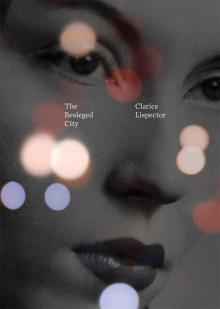 The Besieged City
The Besieged City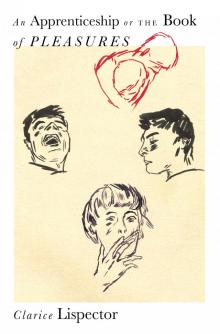 An Apprenticeship or the Book of Pleasures
An Apprenticeship or the Book of Pleasures The Chandelier
The Chandelier A Breath of Life
A Breath of Life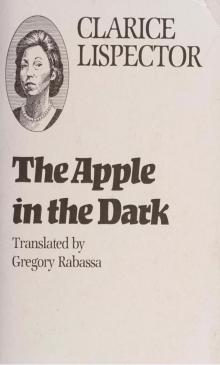 The Apple in the Dark
The Apple in the Dark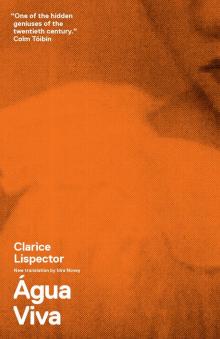 Agua Viva
Agua Viva Complete Stories
Complete Stories Near to the Wild Heart
Near to the Wild Heart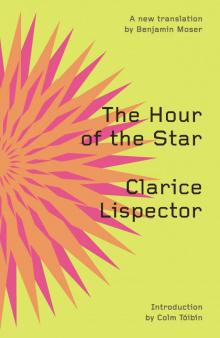 The Hour of the Star ()
The Hour of the Star () The Passion According to G.H.
The Passion According to G.H. The Passion According to GH
The Passion According to GH